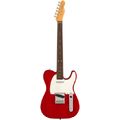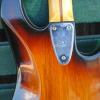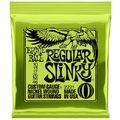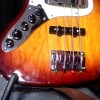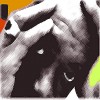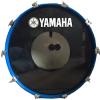This thread is a branch-off from Niltons excellent post about reading music.
We have discussed several aspects of improving as a musician there, and I would like to add another aspect/suggestion on what to work on here.
I guess most of us will agree that to improve as a musician, it does make sense to
- practise your technical skills (brain-to-hand/foot/air coordination), speed
- get theoretical music knowledge, harmonies, reading ability
- practise your timing untill it is rock solid
There is a lot of teaching material on above tasks out there, but I do feel one quite important skill is missing, and often misunderstood as a question of talent.
I'll will call it "meta music" in lack of a better name.
Meta music is a skill which seems to stand on its own and which is only partially compromised by lack of any skill named so far.
You may become a technical genius with perfect timing but lack any meta-music in your playing, and you may play a piece from sheet music that was full of meta-music when performed by its author, but is totally empty of it when played from sheet.
So, what is it?
Think of meta music as the psychological effect created thru music.
It is easy to measure skills like timing, accuracy or speed, to measure the psychological impact of a musical performance is a bit more difficult.
One might do a survey in a live performance and ask which piece "touched" the most people in the audience, or analyze if there were moments where the crowd suddenly cheered or started to dance to measure the presence of "meta music".
My thesis is that creating such moments is a skill that can be learned and is a quite important asset to being a musician.
I will try to stick to the aspects that may be measured, sticking to a kind of scientific paradigm. Personally, I do believe there is even more than that going on in "meta music", but since some of that would probably perceived as rather esoteric, I will try to seperate those ideas.
Let's collect a few perceptions we may hopefully agree upon:
- music has the power to influence the listeners mood, it can evoke all kinds of emotions
- this ability strongly depends on the listeners will, one can block from being touched emotionally, or other outer influences can block the emotional impact of a musical piece (p.e. the song that always made you smile won't work in the middle of an argument)
- the emotional impact of a piece of music is not bound to the notes, arrangement and instruments, nor to the individual players skills - listen to well trained cover bands playing a piece that used to touch you... it will not always be the same.
Let me add two more aspects from my experience as an audio engineer
- interestingly, it is possible to record meta music, while it may not be possible to reproduce the same meta music on another stage with the very same artist
- again, the listener seems to have an impact on the performers skill to produce meta music - this is why live recordings tend to have a different emotional strength
Now, what are my chances as a musician to work with this?
There seems to be quite a lot of uncontrollable aspects, which ones can be influenced at the players end?
There is no guaranteed cause and effect chain in performing meta music, the skilled musician may initiate or offer meta music, but the effect on the listener is not guaranteed.
A skilled meta musician is able to bring 40k listeners in an arena to tears, or will let the whole crowd freak out by bringing back in some bassline just at the right moment. That is a skill, isn't it?
How do I learn that?
First of all, when playing your instrument, instead of focusing on your fingers, changes, problems, try to focus on the meta-music aspect. What emotion are you playing? The less complicated your piece is, the easier it will be for you to focus on the emotional effect of what you are doing - and keep doing just one part or melodic figure for a long time.
I have experienced many moments of "now it feels just right" when doing this, which is not only very satisfactory and motivating, but also a first step towards playing more meta music. It is addictive in a way :)
We are used to try to harmonize our finger movements to the timing, and our choice of notes to the harmonies of a piece, to achieve meta music we will have to try to harmonize our inner emotion to what we are doing.
That does not become easier once you play in a band, which should ideally "carry" the same emotion towards a piece.
I know this may sound pretty far out to many, let me try to break this down with another example:
Think of a funk band playing a live show. Bass and Drums have a track to start, and we have that hot club situation, endorphines in the air - funk party going on.
So, our two guys from the rythm section get it going, and by intention, this should be another "shake your sexy booty"-tune.
At the end of the song, you will either see some people move towards the bar to get a drink, or a cheering crowd with the first people taking their tops off.
What I do believe is that it does depend on the inner attitude of our friends in the band - if one of them is somewhat disturbed by thoughts of "hope I will keep time... will I manage the next fancy lick...", he will not communicate anything else by meta music.
If the band can keep up an inner state of "here you go, now shake that thing!" and enjoy themselfs, people will definetly react differently, don't you think?
So, "inner attitude" is the most powerfull part of meta-music, but I also need to mention some easier to tackle aspects -
we all know its not easy to evoke an emotion towards any given song,
but there are some rather technical aspects to look for which will also impact the emotional result.
To state just a few, you can improve by checking:
- does my playing dynamic (getting louder, playing harder or softer) match the intention of the musical piece? Does my choice of sound fit, or does it create confusion like a synth-subbass in an otherwise angelic hymn?
- focus on the piece and its needs, not just on your instrument. Observe what will happen if you don't play for a few bars: often, the not-playing will create a tention and expectation, and setting back in will create an energetic wave. Dare to let them wait. See what happens.
So, there you go, with a completely different approach on what musical skill includes.
If I put myself into the shoes of someone with some standard musical training who never got any hint in this direction, I imagine it may seem quiet demotivating to play ones own hard-trained repertoire and notice that there is little but "am I glad i finally mastered this piece" on the emotional side...
Finding your own emotionally-matching music may happen on a playing skill level way lower than what you can play in brain-practise mode.
I found it much easier to spot my own authentic music when improvising some chords, adding authentic emotion to a written piece is much more complicated I'd say.
Also, you will notice that some pieces of music or even whole genres are not what you are. I simply couldn't back up any aggressive tracks emotionally, so I'll never be a great metal player, no matter how hard I shred and scream.
I truly admire players who are able to play what they are, and who are able to go into different moods in an authentic way. It does take so much practise (and inner confidence, too) to be able to evoke the needed emotion when facing an audience or a microphone,
but I have seen such beautiful examples of this that I can only encourage thinking about this aspect, no matter what your other skills are.
Hope someone will enjoy this lengthy read :)
We have discussed several aspects of improving as a musician there, and I would like to add another aspect/suggestion on what to work on here.
I guess most of us will agree that to improve as a musician, it does make sense to
- practise your technical skills (brain-to-hand/foot/air coordination), speed
- get theoretical music knowledge, harmonies, reading ability
- practise your timing untill it is rock solid
There is a lot of teaching material on above tasks out there, but I do feel one quite important skill is missing, and often misunderstood as a question of talent.
I'll will call it "meta music" in lack of a better name.
Meta music is a skill which seems to stand on its own and which is only partially compromised by lack of any skill named so far.
You may become a technical genius with perfect timing but lack any meta-music in your playing, and you may play a piece from sheet music that was full of meta-music when performed by its author, but is totally empty of it when played from sheet.
So, what is it?
Think of meta music as the psychological effect created thru music.
It is easy to measure skills like timing, accuracy or speed, to measure the psychological impact of a musical performance is a bit more difficult.
One might do a survey in a live performance and ask which piece "touched" the most people in the audience, or analyze if there were moments where the crowd suddenly cheered or started to dance to measure the presence of "meta music".
My thesis is that creating such moments is a skill that can be learned and is a quite important asset to being a musician.
I will try to stick to the aspects that may be measured, sticking to a kind of scientific paradigm. Personally, I do believe there is even more than that going on in "meta music", but since some of that would probably perceived as rather esoteric, I will try to seperate those ideas.
Let's collect a few perceptions we may hopefully agree upon:
- music has the power to influence the listeners mood, it can evoke all kinds of emotions
- this ability strongly depends on the listeners will, one can block from being touched emotionally, or other outer influences can block the emotional impact of a musical piece (p.e. the song that always made you smile won't work in the middle of an argument)
- the emotional impact of a piece of music is not bound to the notes, arrangement and instruments, nor to the individual players skills - listen to well trained cover bands playing a piece that used to touch you... it will not always be the same.
Let me add two more aspects from my experience as an audio engineer
- interestingly, it is possible to record meta music, while it may not be possible to reproduce the same meta music on another stage with the very same artist
- again, the listener seems to have an impact on the performers skill to produce meta music - this is why live recordings tend to have a different emotional strength
Now, what are my chances as a musician to work with this?
There seems to be quite a lot of uncontrollable aspects, which ones can be influenced at the players end?
There is no guaranteed cause and effect chain in performing meta music, the skilled musician may initiate or offer meta music, but the effect on the listener is not guaranteed.
A skilled meta musician is able to bring 40k listeners in an arena to tears, or will let the whole crowd freak out by bringing back in some bassline just at the right moment. That is a skill, isn't it?
How do I learn that?
First of all, when playing your instrument, instead of focusing on your fingers, changes, problems, try to focus on the meta-music aspect. What emotion are you playing? The less complicated your piece is, the easier it will be for you to focus on the emotional effect of what you are doing - and keep doing just one part or melodic figure for a long time.
I have experienced many moments of "now it feels just right" when doing this, which is not only very satisfactory and motivating, but also a first step towards playing more meta music. It is addictive in a way :)
We are used to try to harmonize our finger movements to the timing, and our choice of notes to the harmonies of a piece, to achieve meta music we will have to try to harmonize our inner emotion to what we are doing.
That does not become easier once you play in a band, which should ideally "carry" the same emotion towards a piece.
I know this may sound pretty far out to many, let me try to break this down with another example:
Think of a funk band playing a live show. Bass and Drums have a track to start, and we have that hot club situation, endorphines in the air - funk party going on.
So, our two guys from the rythm section get it going, and by intention, this should be another "shake your sexy booty"-tune.
At the end of the song, you will either see some people move towards the bar to get a drink, or a cheering crowd with the first people taking their tops off.
What I do believe is that it does depend on the inner attitude of our friends in the band - if one of them is somewhat disturbed by thoughts of "hope I will keep time... will I manage the next fancy lick...", he will not communicate anything else by meta music.
If the band can keep up an inner state of "here you go, now shake that thing!" and enjoy themselfs, people will definetly react differently, don't you think?
So, "inner attitude" is the most powerfull part of meta-music, but I also need to mention some easier to tackle aspects -
we all know its not easy to evoke an emotion towards any given song,
but there are some rather technical aspects to look for which will also impact the emotional result.
To state just a few, you can improve by checking:
- does my playing dynamic (getting louder, playing harder or softer) match the intention of the musical piece? Does my choice of sound fit, or does it create confusion like a synth-subbass in an otherwise angelic hymn?
- focus on the piece and its needs, not just on your instrument. Observe what will happen if you don't play for a few bars: often, the not-playing will create a tention and expectation, and setting back in will create an energetic wave. Dare to let them wait. See what happens.
So, there you go, with a completely different approach on what musical skill includes.
If I put myself into the shoes of someone with some standard musical training who never got any hint in this direction, I imagine it may seem quiet demotivating to play ones own hard-trained repertoire and notice that there is little but "am I glad i finally mastered this piece" on the emotional side...
Finding your own emotionally-matching music may happen on a playing skill level way lower than what you can play in brain-practise mode.
I found it much easier to spot my own authentic music when improvising some chords, adding authentic emotion to a written piece is much more complicated I'd say.
Also, you will notice that some pieces of music or even whole genres are not what you are. I simply couldn't back up any aggressive tracks emotionally, so I'll never be a great metal player, no matter how hard I shred and scream.
I truly admire players who are able to play what they are, and who are able to go into different moods in an authentic way. It does take so much practise (and inner confidence, too) to be able to evoke the needed emotion when facing an audience or a microphone,
but I have seen such beautiful examples of this that I can only encourage thinking about this aspect, no matter what your other skills are.
Hope someone will enjoy this lengthy read :)

